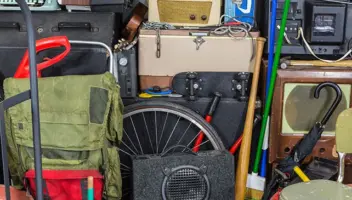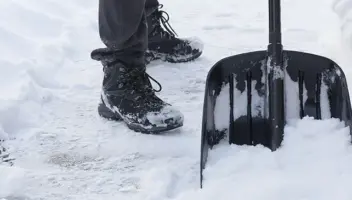How to Fireproof Your Home in 7 Steps

House fires can be devastating. The damage incurred by home fires can be costly to fix, not to mention the emotional toll of losing your home. There are a lot of spots in your home that, left unattended, can increase your risk of house fires.
LeafFilter is in the business of helping you protect your biggest investment – your home – for life. That’s why we’ve compiled this list of fire safety tips to help you fireproof your home from top to bottom.
1. Clean your dryer’s lint trap
The lint trap is an often overlooked part of your home that can spell big trouble if that lint makes contact with any conductors. Lint makes for great kindling, which means it will catch fire easily and burn rapidly. Make sure to regularly clean your lint trap to remove this accelerant. If you use fabric softener, it’s also important to wash your lint trap to remove the buildup of chemicals that could make a house fire even worse. This is an easy DIY task that will make a huge difference in your fire prevention efforts.
2. Protect your gutters
Clogged gutters are one of the leading causes of house fires. The organic debris that clogs gutters is another common household accelerant. When debris dries out, all it takes is a small ember from a fire in the fireplace, or a small spark from the ash of a cigarette to quickly engulf your entire gutter system in flames. Luckily, this type of dangerous debris can be prevented altogether with the help of gutter protection. Fill out the form on our website to see how LeafFilter helps keep your gutters clog-free and worry-free.
3. Sweep your chimney
If you have a fireplace in your home, it’s imperative to have your chimney swept. The creosote that builds up in your chimney over time is highly flammable. Your chimney should be thoroughly cleaned by a professional once a year, preferably before you begin using your fireplace again when winter begins. Having your chimney swept will help to mitigate your risk of fire spreading when you use your fireplace. That way, you can cozy up to your fireplace on a cold, snowy day without the worry of a house fire.
4. Inspect and update your home’s electrical system
Old houses may not be up to code on their electrical systems, so it’s important to have your home inspected for code violations. If any problems with the electrical system are found, it’s imperative for you to have these issues corrected as soon as possible. A professional electrician can help you update your home’s electrical system in order to fireproof your house. It’s also important to avoid overloading your electrical outlets, as this can also pose a fire hazard. Minimize the number of items you plug into your outlets, and be sure to avoid using gadgets with frayed or exposed wires.
5. Mind your candles
Candles smell good and can be extremely relaxing, but, unfortunately, they can also be quite dangerous. There are a few steps you can take to minimize the risk of a home fire while burning candles. Never fall asleep with a candle burning. Keep open flames away from curtains, towels, and other loose fabrics that can catch fire. Be sure your children and pets don’t come near the burning candles as well. You may also want to consider purchasing a few LED candles for the calming effect, and incense for the great smelling effects you’d typically experience with a candle. These flame-free alternatives are much safer, and produce the same results. What could be better?
6. Install smoke detectors
Despite your best efforts, accidents do happen, and you don’t want to be caught off guard if a fire were to start in your home. While installing smoke detectors won’t help in preventing fires in your home, they can help minimize the damage of any house fires you may encounter. By alerting you to the presence of fire in the home, smoke detectors not only protect your and your family from harm, but they can also give you the gift of time. The more time you have to control a home fire, the better chance you’ll have of reducing damage to your home.
7. Get fire extinguishers
Like smoke detectors, fire extinguishers are important to have on hand in the event that a fire were to occur in your home. They’re helpful to have for small fires, which can sometimes be controlled with a simple blast from the fire extinguisher. However, be aware that larger fires may be beyond the help of a fire extinguisher. In this event, it is best to simply evacuate your home for your own personal safety. Things can always be replaced, but your life cannot.
These 6 tips are a great start for fireproofing your home, but there are countless other things you can do to limit your risk of house fires. For more tips of fireproofing your home, emergency preparedness, and more, contact your local fire department on their non-emergency line.



